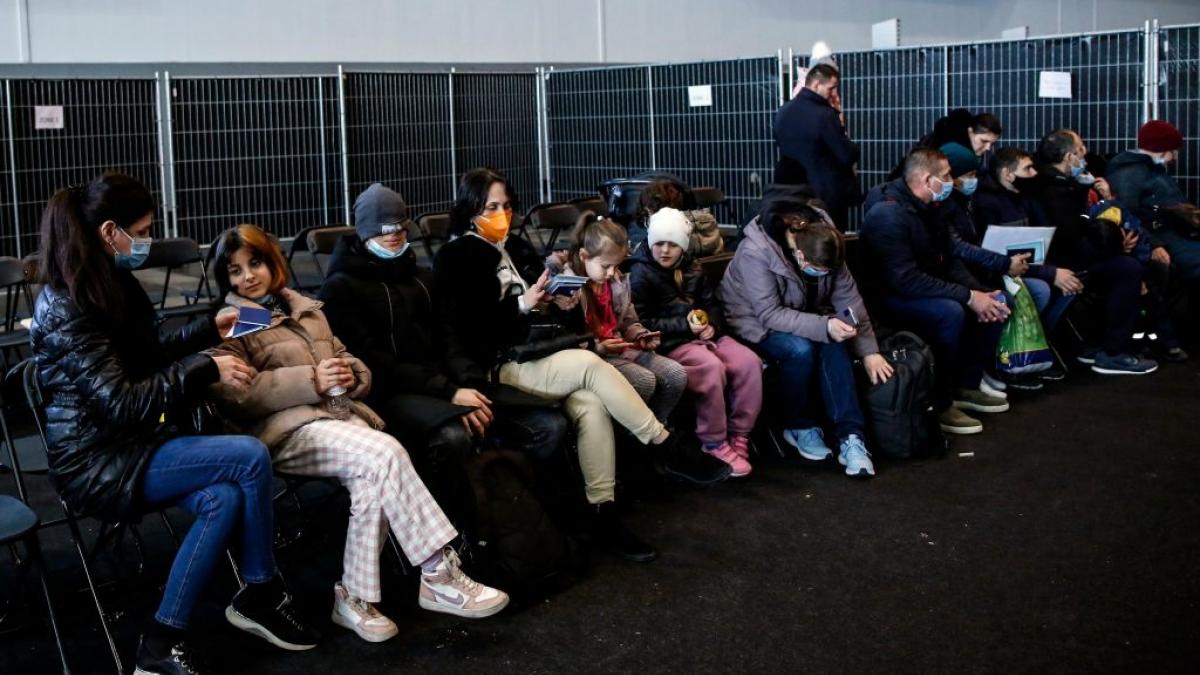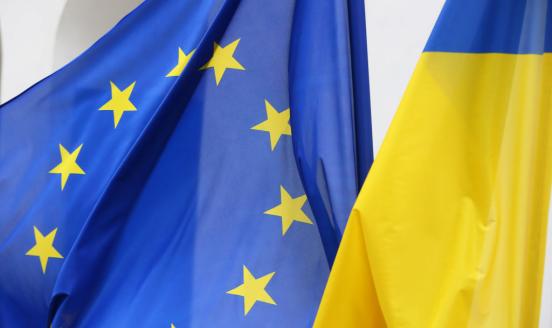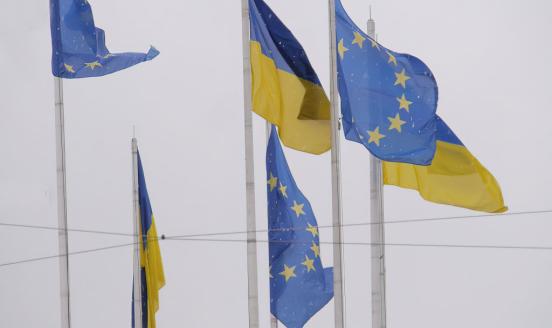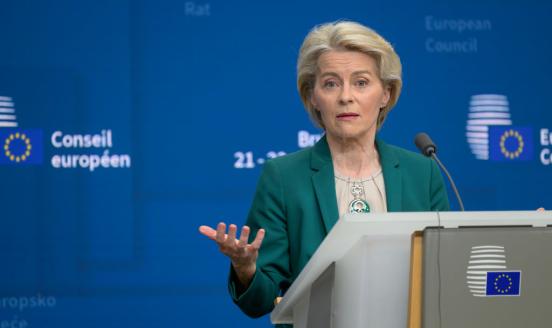A new Thessaloniki offer: the aspirations of Georgia, Moldova, and Ukraine to join the EU
The European Union should grant candidate status to Georgia, Moldova and Ukraine, as part of a long-term stabilisation strategy.

On Monday 28 February 2022, Ukraine’s President Volodymyr Zelenskyy, Prime Minister Denis Shmygal and Speaker of Verkhovna Rada (Ukraine’s parliament) Ruslan Stefanchuk signed an application for Ukrainian membership in the EU and asked for “immediate accession via a new special procedure”. Their request was repeated the next day when President Zelenskyy spoke via videolink to a plenary session of the European Parliament. The Parliament backed the request in a resolution of 1 March on the Russian aggression against Ukraine, calling for “the EU institutions to work towards granting EU candidate status to Ukraine, in line with Article 49 of the Treaty on European Union and on the basis of merit, and, in the meantime, to continue to work towards its integration into the EU single market along the lines of the Association Agreement”. The President of the European Commission also responded positively to Ukraine’s aspirations, saying “They are one of us and we want them in”.
Following Ukraine’s application, two other Eastern Partnership (EaP) countries – Georgia and Moldova – announced their applications for EU membership.
These three applications should surprise nobody. All three countries declared their geostrategic interest in joining the EU already in the early or mid-2000s. All three have been victims of the imperial policy of Putin’s Russia by being invaded by the Russian army (Georgia in 2008, Ukraine in 2014-2015 and now) and/or by losing control over parts of their territories (Transnistria in Moldova; Abkhazia and South Ossetia in Georgia; Crimea and one-third of Donbas in Ukraine, plus territories occupied in the current war). They want to anchor their independence and the chance of peaceful development in the Euro-Atlantic security alliances and the European integration system. They also seek external anchors (incentives) for their domestic economic, political and economic reforms. The previous European Economic Community/EU enlargement rounds since the 1980s demonstrated that the accession process can play this role effectively.
All three countries have Association Agreements with the EU (signed in 2014), including Deep and Comprehensive Free Trade Area (DCFTA) provisions, and they are advanced in their implementation. Citizens of the countries can travel without visas to the EU (citizens of Moldova since 2016; citizens of Georgia and Ukraine since 2017).
How should EU countries react to these applications? The decision to grant EU candidate status and start membership negotiations requires unanimity. It is no secret that, for various economic and political reasons, the political appetite for further EU enlargement has declined since Croatia acceded in 2013. This is seen in the slow accession process of the Western Balkan countries. All three new applicants have income-per-capita levels far below the EU average. They suffer from immature institutions, poor business climates, corruption (except Georgia) and unresolved territorial problems (see above). These circumstances may discourage some EU member states, especially those further away from eastern Europe, from responding positively. Reservation was signalled by the President of the European Council Charles Michel, who spoke about “different opinions and sensitivities” among EU countries in relation to Ukraine’s application.
However, the lack of positive response or up-front rejection of membership applications would be a strategic mistake at the current critical juncture of European history.
First, it would go against the spirit and letter of Article 49 of the Treaty on the European Union (TEU), which says that “…any European State which respects the values referred to in Article 2 and is committed to promoting them may apply to become a member of the Union.”
Second, it would mean the EU reneging on its goals of establishing an area of stability and prosperity in its direct neighbourhood.
Third, it would discourage applicants from reforming their states and economies. And for Ukraine now, it would undermine the morale and determination of its leaders, army and the entire society to resist aggression.
Fourth, it would disregard the existing strong economic ties between the three EaP countries and the EU. The EU is their largest trade partner. In 2020, it accounted for 52.3% of the total trade of Moldova, 39.2% for Ukraine and 22.4% for Georgia. Trade reorientation towards the EU helped these countries, particularly Ukraine after 2014, to neutralise the adverse effects of Russian trade protectionist measures applied against them. The EU is also a significant source of incoming foreign direct investment to Georgia, Moldova and Ukraine. The EU accession process would help consolidate these ties and contribute to the modernisation of all three economies.
There is a relevant precedent after the series of tragic conflicts in the former Yugoslavia in the 1990s. In June 2003, the EU summit in Thessaloniki expressed “unequivocal support to the European perspective of the Western Balkan countries.” It also declared that “the future of the Balkans is within the European Union”. It opened the process of European integration for this region. Although today, almost two decades after this declaration, only Croatia is an EU member, four other countries (Albania, Montenegro, North Macedonia and Serbia) have EU candidate status. Montenegro and Serbia are in accession negotiations. Despite the slow pace and various shortcomings of the accession process in the Western Balkans, it has stabilised the region politically and has incentivised economic and institutional reforms in individual countries.
Of course, EU accession must take time, especially for less economically and institutionally developed candidates. It will not happen immediately, as President Zelenskyy would like to see. Time is needed to meet the Copenhagen criteria of EU membership, adopt all the acquis communautaire, and negotiate technical and institutional aspects of its implementation. The speed and outcome of this process usually depend on the political determination of a candidate country and its ability to implement all the required reforms and legal harmonisation, and the goodwill of EU countries that have legal power to block accession at each stage. Unfortunately, this power is sometimes overused, as in the case of North Macedonia, which obtained candidate status in 2005 but had to wait for a long time to start membership negotiations because of obstruction on the part of some of its neighbours. Such practices may derail the entire EU accession process and deprive it of its motivational character.
The EU also has essential homework to do. Once again, it must reform its institutions and decision-making process (the last time it was done in the Lisbon Treaty signed in December 2007). Further expansion of qualified majority voting and reduction of the list of decisions that require unanimity is the most urgent component of such reform. Too often, the current EU becomes a hostage to individual countries’ veto powers, for example, in the areas of the Common Foreign and Security Policy, Multiannual Financial Framework, or EU enlargement. Increasing the number of member states without fixing this problem would complicate the situation further.
The three new applicants have one advantage that most Western Balkan countries (except Croatia) did not have in 2003: the functioning Association Agreements, including their economic and trade components, which have already required adoption of a substantial part of the acquis.
Repeating the 2003 Thessaloniki type offer to the three EaP countries and starting their EU accession path would not determine the outcome or timing, both of which would be dependent on the progress in adopting the acquis. It would not also prevent various intermediate solutions, such as further deepening trade and investment relations (especially in agriculture and service sectors), or closer political association in the meantime, preferably by upgrading the existing Association Agreements. It would only help the long-term goal of EU integration.
Recommended citation:
Dabrowski, M. (2022) ‘A new Thessaloniki offer: the aspirations of Georgia, Moldova, and Ukraine to join the EU’, Bruegel Blog, 15 March
Acknowledgment:
The author would like to thank Anne Bucher, Christophe Carugati, Francesco Papadia, Georgios Petropoulos, Andre Sapir, and Nicolas Véron for their comments on the earlier versions of this blog post.



